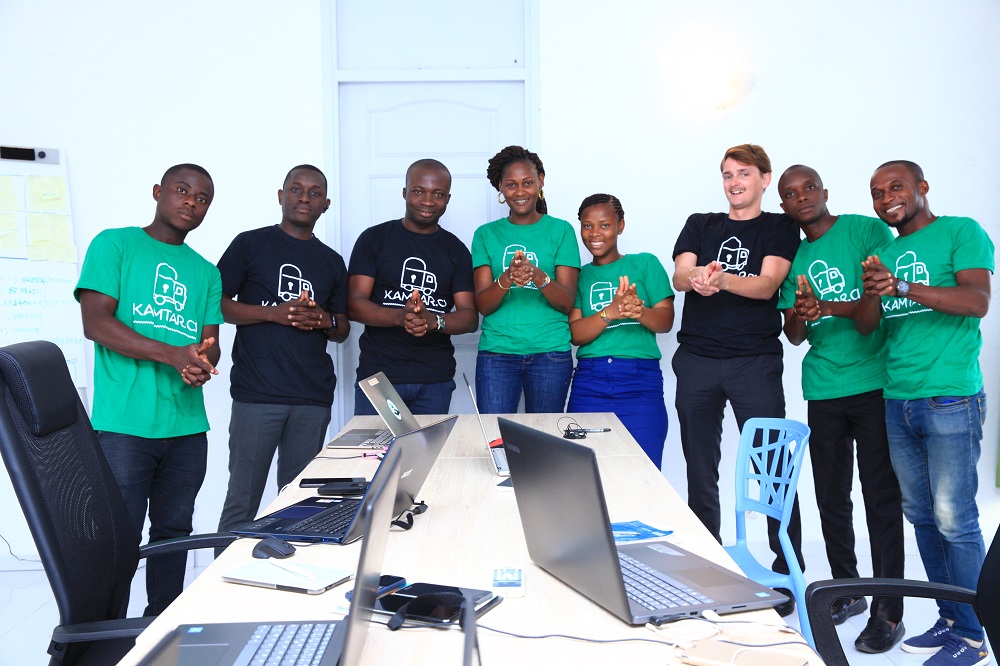Logistics providers and goods suppliers are both “struggling like madmen” in Africa, because there is no solution available to streamline transactions between them, according to the co-founders of Ivorian startup Kamtar, which is looking to fill the gap.
Goods transportation is a crucial sector, which if done well, has a “super positive impact” on pricing for the end-consumer, as well as on access to goods through a country, says Arthur Thuet, co-founder of Kamtar. However, in many African countries, logistics companies are unstructured, expensive and offer poor quality of service, he says.
“What is surprising is that you have a huge demand, because road transportation is the only way to move stuff in many African countries – 90 per cent of intraregional trade; and you have a gigantic offer, but both struggle like madmen,” Thuet says.
“In fact, they are just missing a link between them. And that is what we are trying to be.”
Kamtar launched to market in January, offering an online goods transportation booking platform catering to both businesses and individual consumers.
Users visit the website, enter in the details of the transport job they require fulfilling, and the platform matches this to a truck driver registered on the site. A price offer is generated, which the user can review and accept – to be paid on completion of the job. A call centre is also on hand to for those who prefer not to book via the internet, as well as to follow up on new bookings.
“The driver receives all the information on his driver app so that he can carry the trip out on D-day. Then at every step of the journey – departure, loading, and unloading – he uses the app to inform our staff and the customer about the delivery process. The customer can also follow the driver on a map, which is quite convenient in a country where physical addresses do not exist,” Thuet says.
Kamtar generates revenues on a commission basis – taking a fee of between 15 and 30 per cent on conclusion of the trip. The driver takes payment for a completed trip, and then transmits the fee to Kamtar using mobile money.
Since launching two months ago, over 400 drivers have registered on the platform, with 15 returning customers using the service regularly.
The startup expects this number to grow rapidly as the platform becomes a “reflex” for suppliers looking for transportation services. Given that logistics is a significant pain for suppliers, Thuet says they readily understand the value proposition presented by Kamtar.
“It is not a hard sell at all. What is complicated is to get them to think about you when they have a need, because those people did not wait for us to exist and they already have their own ways to figure deliveries out. We are working hard to become ‘reflex’ when wondering about goods transportation,” he says.
Similarly for logistics providers, Kamtar offers a new route to extended markets.
“Abidjan is divided into neighbourhoods. Right now, it is very hard for a driver from one area to get customers from another area. They often spend the day without any revenue and have no way to solve this situation. Thanks to Kamtar, they can get access to a new pipe of activity across the whole country,” Thuet says.
Perhaps the biggest hurdle for Kamtar has been the illiteracy and lack of tech skills of the drivers registering on the platform. For the platform to work seamlessly, drivers need to use a smartphone and update their activities via the app regularly. As such, a lot of the startup’s work revolves around training drivers, and ensuring jobs are completed according to proper purchase orders, and with transparent pricing.
A steep climb lies ahead for the startup, and Kamtar wants to first focus on dominating the Ivorian market. However, down the line the company envisages entering neighbouring markets, to offer cross-border logistics services.
“First, we want to become a key player in logistics in Ivory Coast. We try to position ourselves as the top-of-mind answer for deliveries outside of Abidjan, towards other cities in Ivory Coast or border countries, because it is very badly addressed today,” Thuet says.
“Once we manage to do that, we plan on opening an office in a border country because being on both ends of a corridor is a very interesting position for a logistics operator to rationalise return journeys.”


